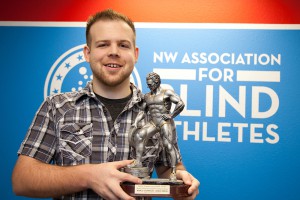This Clark student started his own nonprofit at age 15

Billy Henry began lifting weights as a teenager, an experience he found so empowering that he decided to create a nonprofit dedicated to promoting athletics and physical fitness among the blind and visually impaired.
Cast your mind back to your high school physical education classes and ask yourself: How many of those activities could you have done blindfolded? Basketball? No way. Relay races? Only if someone made significant changes to the way it was organized. Dodgeball? Please.
Small wonder, then, that almost 70 percent of all blind or visually impaired school-aged children in the U.S. never participate in any sort of sport, physical activity, or physical education program. The result is that many miss out on opportunities to boost their confidence, teamwork skills, and both physical and mental health. But thanks to Clark student Billy Henry, all that’s changing in the Pacific Northwest.
Henry, 21, is the executive director of the Northwest Association of Blind Athletes (NWABA), a nonprofit organization dedicated to creating opportunities for blind and visually impaired people to participate in sports and physical activities. He founded the organization in 2007, when he was all of 15 years old.
Henry, who is legally blind due to a congenital condition called optic nerve hypoplasia, might well have become part of that 70 percent of non-active youth if he hadn’t discovered the sport of powerlifting in his teens. Energized by what he calls the “life-changing” boost in self-confidence and strength provided by competing in this sport, he decided to create the NWABA to share that feeling with other blind and visually impaired people.
“I just saw a real need in the community,” says Henry. “There are a lot of challenges to blind and visually impaired people joining sports and physical activities, and I wanted to give them that opportunity to gain confidence and self-esteem to carry into other parts of their lives.”
The organization started small, with just six people practicing powerlifting in the Henry family’s garage; Henry’s parents would make dinner for the team twice a week. “I got a couple friends to be on the board of directors—it took some arm-twisting,” recalls Henry, who at the time was attending Hudson’s Bay High School. “I sat down with a friend to fill out the 32-page IRS application for 501c3 [nonprofit] status. Fundraising was really challenging. We held a lot of bake sales.”
The effort paid off: Over the next six years, the organization grew in leaps and bounds. In 2012, more than 1,000 blind and visually impaired people participated in NWABA events, which now include activities like judo, tandem cycling, swimming, track and field, skiing, baseball, golf, and an adaptive form of ping pong called showdown. With an operating budget of $150,000, the organization has expanded its reach to Washington, Oregon, Idaho, and Montana; this summer, it hosted the 2013 National Goalball Championships, featuring a sport specifically developed for blind and visually impaired athletes.

Clark student Billy Henry became interested in weight lifting while still in high school, in part because the sport allowed him to compete on an even footing with sighted athletes. Here he holds a trophy from the World Association of Benchers and Dead Lifters.
Henry now operates out of an office in downtown Vancouver, which he moved into in the fall of 2010—the same time he enrolled at Clark to study business administration. “I chose Clark because it allowed me to stay local and I knew it had a good reputation for its disability support services,” says Henry. “They’re phenomenal. They’re really experienced with working with blind and visually impaired students and understanding each student’s individual needs.”
Clark College Director of Access Services Tami Jacobs says that the college has a high proportion of students who are blind or visually impaired, in part due to its proximity to the Washington State School for the Blind (just a block away from Clark’s main campus) and its strong working relationship with the Washington State Department of Services for the Blind. Jacobs says she and her staff work hard to provide a welcoming and supportive learning environment for students of all abilities. Jacobs says she has been impressed by Henry’s work ethic, both in class and with the NWABA. “He is driven, passionate, and looks for solutions outside of the box,” she says.
“It’s interesting, because at the nonprofit I get a lot of hands-on learning,” says Henry. “And at the same time I do learn a lot in my business classes that I’ve brought into the nonprofit. Reading financial statements is much easier since I’ve taken Accounting.”
Henry has taken a mix of in-person and online classes, noting that online classes offer certain advantages for the visually impaired. “I struggle with math, and I really like [taking] math classes online because I can go back and watch a video lecture over and over, and get as close to the screen as I want,” he says. “That’s more challenging in a room with a whiteboard. But I also really like the personal interaction that you get in the physical classroom setting.”
Henry expects to graduate from Clark in 2014 and plans to attend Washington State University Vancouver afterward to earn a bachelor’s degree in business. Meanwhile, he plans to continue growing NWABA, even if that means eventually handing the reins over to someone else.
“It’s hard, because I want to keep doing the work,” he says. “But getting my education is very, very important to me as well.”
Eventually, he would like to earn a master’s degree—either in business or in health care administration. When someone mentions that health care organizations could probably benefit from his unique perspective, Henry chuckles softly.
“Yeah, that’s what I thought, too,” he says.
Photos: Clark College/Jenny Shadley












